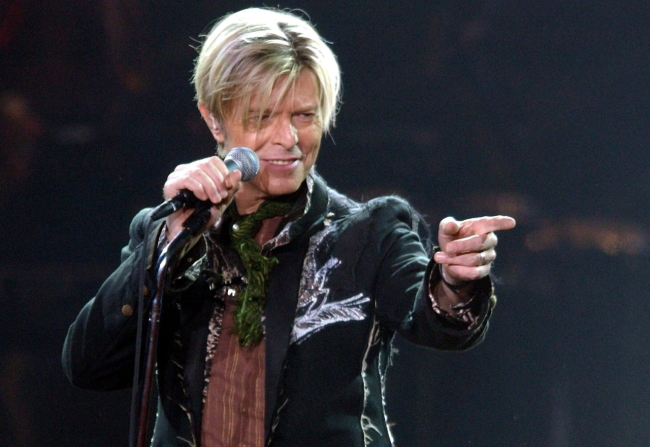NEW YORK (AFP) - When David Bowie walked unassumingly into a cozy New York jazz club to hear Donny McCaslin play, the saxophonist admits he wasn’t well-versed in the rock icon’s vast discography.
Bowie, who had a vision for the rhythmic underpinning of what would become his final album, met McCaslin in person a week later and soon emailed him to propose a collaboration.
“Blackstar,” Bowie’s 25th studio album, showed the legendary rocker experimenting until the end, crafting a style of hard jazz as his voice duels with the saxophone of McCaslin, an artist who has pushed the boundaries of electronica in jazz.
“Blackstar” was released to wide praise on Jan. 8, 2016, Bowie’s 69th birthday. Two days later, he stunned the world when he died after an undisclosed battle with cancer.
“It’s been a year like none other for me,” McCaslin told AFP at a coffeehouse in Greenwich Village.
“I was so happy to see the critical acclaim, particularly for David. It was all so wonderful. And then he passed away and I was just devastated emotionally.”
 |
Late British rock legend David Bowie performs on stage during his concert in Hamburg, Germany, Oct. 16, 2003, in this file picture. (EPA-Yonhap) |
In October, McCaslin and his band released their own album, “Beyond Now,” which was inspired by “Blackstar.”
But he still struggles to listen to “Blackstar,” saying he is “still processing the feelings around it.”
Affable but with clear emotion when discussing Bowie, McCaslin had partied in high school to the rocker’s disco-pop “Let’s Dance,” but otherwise knew little of his work.
After he signed on for “Blackstar,” the 50-year-old California native listened to Bowie classics but soon stopped, realizing Bowie had chosen him for his own sound.
“I had an email exchange with him about it and I said something like, ‘Hey, I’m checking out some of your history.’ And he said, ‘Oh, what are you listening to?’”
McCaslin listed some of Bowie’s most famous tracks such as “Life on Mars,” “Space Oddity” and “Changes.”
“He said something to the effect of, ‘You know, that’s older stuff. I’m into some different stuff now.’”
“Blackstar,” which went to No. 1 on charts around the Western world, topped numerous critics’ lists for the best albums of 2016.
But it did not earn a Grammy nomination for album of the year, whose contenders include balladeer Adele’s blockbuster “25” and pop celebrity Justin Bieber’s “Purpose.”
“I like Adele -- nothing against her -- but look at the content of ‘Blackstar,’ the artistic content. There is no comparison,” said McCaslin, a three-time Grammy nominee.
“Justin Bieber and ‘Blackstar?’ I mean, come on!” he said. “It was pretty disappointing because it is such a work of art, ‘Blackstar.’ But anyway, it’s out of my hands.”
McCaslin politely declined to say if he knew about Bowie’s cancer, but said Bowie was “always super present” and warm.
Bowie would generally compose songs at his New York penthouse, he said, making demos with drum machines, synthesized bass, guitar and vocals and occasionally playing saxophone himself.
The rock star would walk to The Magic Shop studio where McCaslin would interact musically with him, improvising sax and adding harmony.
Bowie would make suggestions at night as he fine-tuned the lyrics. After his death, listeners have pored over the lyrics on “Blackstar” for meanings.
On “Lazarus” and the title track, Bowie reflects on death and appears to reference alter ego characters from his past. On “Dollar Days” -- whose music, McCaslin said, emerged spontaneously in the studio -- Bowie wistfully bids farewell to the evergreen trees of his native England, while he concludes on a note of mystery and hope on “I Can’t Give Everything Away.”
McCaslin said he did not focus on the lyrics and instead responded to the emotion of Bowie’s voice as an instrument.
McCaslin downplayed suggestions that Bowie designed “Blackstar” as a definitive final statement.
“I have read so much about that,” he said. “But my experience was that he was moving forward, in that he was talking about recording more music. So just that alone makes me think that I don‘t know about it being a farewell.”
The band recorded plenty of music that did not make the album, McCaslin said. Bowie made clear he wanted “Blackstar” to be concise -- it has only seven tracks -- partly so he and longtime producer Tony Visconti could mix it to be as close to perfect as they wanted, he added.
Three previously unreleased songs from the “Blackstar” sessions appeared on the soundtrack released in October for Bowie’s musical “Lazarus.”
“Beyond Now,” the title track from McCaslin’s album, was inspired by a song that did not make “Blackstar.” On the album, the band also covers Bowie as well as electronic artists such as Deadmau5 and The Chainsmokers.
While not intending to become a Bowie cover act, McCaslin said he will forever be influenced by him.
“At 68, he could have been doing anything, but instead he had us,” he said.
“He was not afraid to do that. You see someone at his level and this point of his career and that’s really inspiring.”








